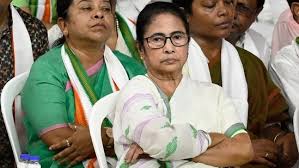NEW DELHI: Union Minister Annapurna Devi on Friday asserted that existing laws were stringent enough to tackle violence and crimes against women and urged the West Bengal government to implement the same in “letter and spirit”.
In a letter to West Bengal Chief Minister Mamata Banerjee, the second in a week, Devi, the Union Minister for Women and Child Development, said the state government has not operationalised additional 11 Fast Track Special Courts (FTSC) to specifically deal with cases of rape and POCSO cases.
Devi said West Bengal has established 88 Fast Track Courts (FTCs), which are not the same as the Fast Track Special Courts (FTSCs) covered under the Central Government Scheme.
Banerjee on Friday wrote to Prime Minister Narendra Modi, reiterating her request for stringent central legislation and exemplary punishment on heinous crimes like rape and murder.
Banerjee, who wrote to Modi a few days ago on the issue following nationwide uproar over the rape and murder of a doctor at the R G Kar Medical College and Hospital in Kolkata on August 9, sought mandatory provision for time-bound disposal of cases of rape/rape and murder.
“In spite of the pendency of 48,600 rape and POCSO cases in West Bengal, the State has not operationalised additional 11 FTSCs which may be exclusive POCSO courts or combined FTSCs dealing with both rape and POCSO cases, as per the state’s requirement,” the Union Minister said in the letter to Banerjee.
“As may be seen, the information contained in your letter in this regard is factually incorrect and appears to be a step in the direction to cover up the delays in operationalising the FTSCs by the state,” Devi said.
Concerning Banerjee’s observation on the need to post permanent judicial officers in FTSCs, the Union minister said the scheme guidelines clearly provide for one judicial officer and seven staff to work exclusively for the disposal of rape and POCSO Act cases.
“Hence, an additional charge of FTSCs cannot be given to any permanent judicial officer or court staff. This position was clarified earlier to the West Bengal,” Devi said.
She said in the event of an insufficient workforce, states and Union Territories have the option to engage judicial officers and court staff on a contractual basis under the FTSC scheme.
“As regards, stringent legislations and exemplary punishment on heinous crimes like rape/rape and murder, I reiterate my earlier communication conveying that stringent punishments for rape/rape with murder already exist in the Bharatiya Nyaya Sanhita (BNS),” the minister said.
Devi said the enactments by the central government are comprehensive and stringent enough to tackle the violence and crimes against women.
“If the state government follows the central legislations in letter and spirit, it will certainly have a lasting impact on strengthening the criminal justice system, bringing the perpetrators of such crimes to face the consequences commensurate with the offence and also in ensuring justice to the victims or survivors,” the union minister said.
“I once again request you to ensure due sensitisation and positive approach of all duty holders at appropriate levels to ensure proper handling of cases with due care and attention to bring finality as per the timelines prescribed under the statutes,” Devi said.


